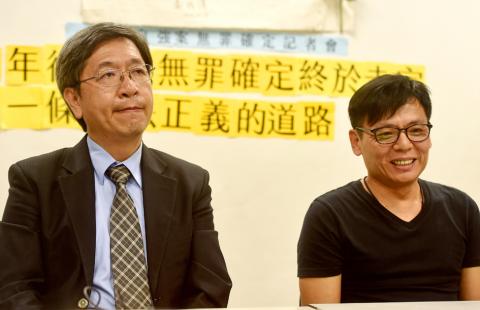In a final decision yesterday, the Supreme Court ruled that former death row inmate Hsu Tzu-chiang (徐自強) was not guilty of the 1995 kidnap and murder of a businessman, rejecting an appeal by prosecutors to end a case that has bounced around the court system for more than two decades and become one of the nation’s highest-profile human rights cases.
Prosecutors had appealed a High Court decision last year to overturn Hsu’s guilty verdict.
Accompanied by lawyers and supporters, Hsu fought back tears at a news conference in Taipei yesterday afternoon.

Photo: Chien Jung-fong, Taipei Times
“When I heard the ruling, it felt unreal to me; maybe I had heard it wrong,” Hsu said. “My mother will celebrate her birthday soon, and this will be the best gift she could get, because over the past 21 years, she has suffered the most.”
“I wanted to give up this fight, as I had given up on the justice system, but my family and my lawyers persisted; they did not want to give up,” Hsu said. “Some people asked if I had bad fortune, but I do not think so, because I feel lucky to be able to walk out of prison.”
Hsu was originally convicted of the September 1995 kidnap and murder of Huang Chun-shu (黃春樹), whose kidnappers sought a ransom of NT$70 million (US$2.2 million at current exchange rates).
Two men, Huang Chun-chi (黃春棋) and Chen Yi-lung (陳憶隆), who were convicted as being the main perpetrators and sentenced to death, had claimed in their trials that Hsu was an accomplice.
Hsu’s saga saw him handed the death sentence nine times and a term of life imprisonment twice, while there were five extraordinary appeals.
He was incarcerated for 16 years, spending most of the time on death row, before being released on May 19, 2012.

NO HUMAN ERROR: After the incident, the Coast Guard Administration said it would obtain uncrewed aerial vehicles and vessels to boost its detection capacity Authorities would improve border control to prevent unlawful entry into Taiwan’s waters and safeguard national security, the Mainland Affairs Council (MAC) said yesterday after a Chinese man reached the nation’s coast on an inflatable boat, saying he “defected to freedom.” The man was found on a rubber boat when he was about to set foot on Taiwan at the estuary of Houkeng River (後坑溪) near Taiping Borough (太平) in New Taipei City’s Linkou District (林口), authorities said. The Coast Guard Administration’s (CGA) northern branch said it received a report at 6:30am yesterday morning from the New Taipei City Fire Department about a

IN BEIJING’S FAVOR: A China Coast Guard spokesperson said that the Chinese maritime police would continue to carry out law enforcement activities in waters it claims The Philippines withdrew its coast guard vessel from a South China Sea shoal that has recently been at the center of tensions with Beijing. BRP Teresa Magbanua “was compelled to return to port” from Sabina Shoal (Xianbin Shoal, 仙濱暗沙) due to bad weather, depleted supplies and the need to evacuate personnel requiring medical care, the Philippine Coast Guard (PCG) spokesman Jay Tarriela said yesterday in a post on X. The Philippine vessel “will be in tiptop shape to resume her mission” after it has been resupplied and repaired, Philippine Executive Secretary Lucas Bersamin, who heads the nation’s maritime council, said

REGIONAL STABILITY: Taipei thanked the Biden administration for authorizing its 16th sale of military goods and services to uphold Taiwan’s defense and safety The US Department of State has approved the sale of US$228 million of military goods and services to Taiwan, the US Department of Defense said on Monday. The state department “made a determination approving a possible Foreign Military Sale” to the Taipei Economic and Cultural Representative Office in the US for “return, repair and reshipment of spare parts and related equipment,” the defense department’s Defense Security Cooperation Agency said in a news release. Taiwan had requested the purchase of items and services which include the “return, repair and reshipment of classified and unclassified spare parts for aircraft and related equipment; US Government

More than 500 people on Saturday marched in New York in support of Taiwan’s entry to the UN, significantly more people than previous years. The march, coinciding with the ongoing 79th session of the UN General Assembly, comes close on the heels of growing international discourse regarding the meaning of UN Resolution 2758. Resolution 2758, adopted by the UN General Assembly in 1971, recognizes the People’s Republic of China (PRC) as the “only lawful representative of China.” It resulted in the Republic of China (ROC) losing its seat at the UN to the PRC. Taiwan has since been excluded from